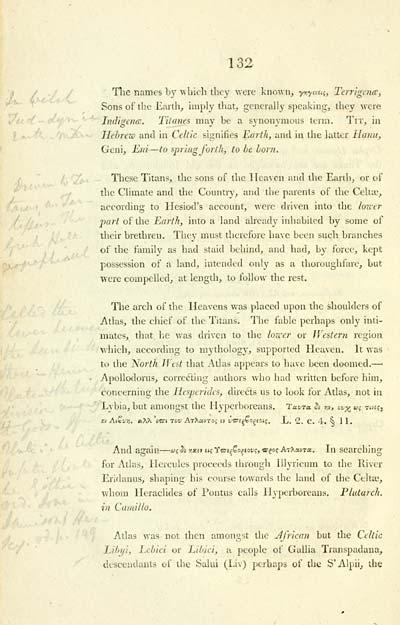Blair Collection > Celtic researches, on the origin, traditions & language, of the ancient Britons
(222)
Download files
Complete book:
Individual page:
Thumbnail gallery: Grid view | List view

132
Tlie names by which they ^γel"c known, yr.ynui, Terrigcna,
Sons of the Earth, imply tliat, generally speaking, they were
Indigence. Titanes may be a synonymous term. Tit, in
Hebrew and in Celtic signifies J^arth, and in the latter Hanu,
Gcni, Eni — to sjjring forth, to be born.
These Titans, the sons of the Heaven and the Earth, or of
the Climate and the Country, and the parents of the Celta?,
according to Hesiod's account, were driven into the loicer
part of the Earth, into a land already inhabited by some of
their brethren. They must therefore have been such branches
of the family as had staid behind, and had, by force, kept
possession of a land, intended only as a thoroughfare, but
were compelled, at length, to follow the rest.
Tlie arch of the Heavens was placed upon the shoulders of
Atlas, the chief of the Titans. The fable perhaps only inti-
mates, that, he was driven to the loiver or Western region
which, according to mythology, supported Heaven. It was
to the North West that Atlas appears to have been doomed. —
Apollodorus, correéling authors who had written before him,
concerning the Jlesperidcs, directs us to look for Atlas, not in
Lybia, but amongst the Hyperboreans. Tat /τα o£ r,ii, ονχ ας 7*»εΐ,
tv Αίζν-ή. Λλλ ΈΐϊΓί τον Ατλαντος £v ν•ΰ^εξζθξίθίς. L. 2. C. 4. § 1 1.
And again — w? ^í rxn εκ Ίτπξζοξίους, «rgoç Ατλαντα. In searching
for Atlas, Hercules proceeds through lllyricum to the River
Eri<lanus, shaping his course towards the land of the Celtas,
ΛvIlom Heraclides of Pontus calls Hyperboreans. Plutarch,
in Ca/nillo.
Atlas Avas not then amongst the Jfrican but the Celtic
Libyi, Eebici or Eibici, a people of Gallia Transpadana,
descendants of the Sului (Liv) perhaps of the S'Alpii, the
Tlie names by which they ^γel"c known, yr.ynui, Terrigcna,
Sons of the Earth, imply tliat, generally speaking, they were
Indigence. Titanes may be a synonymous term. Tit, in
Hebrew and in Celtic signifies J^arth, and in the latter Hanu,
Gcni, Eni — to sjjring forth, to be born.
These Titans, the sons of the Heaven and the Earth, or of
the Climate and the Country, and the parents of the Celta?,
according to Hesiod's account, were driven into the loicer
part of the Earth, into a land already inhabited by some of
their brethren. They must therefore have been such branches
of the family as had staid behind, and had, by force, kept
possession of a land, intended only as a thoroughfare, but
were compelled, at length, to follow the rest.
Tlie arch of the Heavens was placed upon the shoulders of
Atlas, the chief of the Titans. The fable perhaps only inti-
mates, that, he was driven to the loiver or Western region
which, according to mythology, supported Heaven. It was
to the North West that Atlas appears to have been doomed. —
Apollodorus, correéling authors who had written before him,
concerning the Jlesperidcs, directs us to look for Atlas, not in
Lybia, but amongst the Hyperboreans. Tat /τα o£ r,ii, ονχ ας 7*»εΐ,
tv Αίζν-ή. Λλλ ΈΐϊΓί τον Ατλαντος £v ν•ΰ^εξζθξίθίς. L. 2. C. 4. § 1 1.
And again — w? ^í rxn εκ Ίτπξζοξίους, «rgoç Ατλαντα. In searching
for Atlas, Hercules proceeds through lllyricum to the River
Eri<lanus, shaping his course towards the land of the Celtas,
ΛvIlom Heraclides of Pontus calls Hyperboreans. Plutarch,
in Ca/nillo.
Atlas Avas not then amongst the Jfrican but the Celtic
Libyi, Eebici or Eibici, a people of Gallia Transpadana,
descendants of the Sului (Liv) perhaps of the S'Alpii, the
Set display mode to: Large image | Transcription
Images and transcriptions on this page, including medium image downloads, may be used under the Creative Commons Attribution 4.0 International Licence unless otherwise stated. ![]()
| Early Gaelic Book Collections > Blair Collection > Celtic researches, on the origin, traditions & language, of the ancient Britons > (222) |
|---|
| Permanent URL | https://digital.nls.uk/75766331 |
|---|
| Description | A selection of books from a collection of more than 500 titles, mostly on religious and literary topics. Also includes some material dealing with other Celtic languages and societies. Collection created towards the end of the 19th century by Lady Evelyn Stewart Murray. |
|---|
| Description | Selected items from five 'Special and Named Printed Collections'. Includes books in Gaelic and other Celtic languages, works about the Gaels, their languages, literature, culture and history. |
|---|

